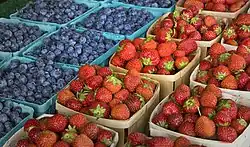oga
English
Pronunciation
- (Received Pronunciation) IPA(key): /ˈəʊ.ɡə/
- (General American) enPR: ōʹgər, IPA(key): /ˈoʊ.ɡɚ/
- Rhymes: -əʊɡə
- Homophone: ogre
Noun
oga (plural ogas) (West Africa)
- A chief, employer, or superior.
- 2013, Chimamanda Ngozi Adichie, chapter 50, in Americanah:
- Nigeria is not a nation of sandwich-eating people and his last oga did not eat bread in the afternoon.
-
Estonian
Declension
Inflection of oga (ÕS type 17/elu, no gradation)
| singular | plural | |
|---|---|---|
| nominative | oga | ogad |
| accusative | oga | ogad |
| genitive | oga | ogade |
| partitive | oga | ogasid |
| illative | okka ogasse |
ogadesse |
| inessive | ogas | ogades |
| elative | ogast | ogadest |
| allative | ogale | ogadele |
| adessive | ogal | ogadel |
| ablative | ogalt | ogadelt |
| translative | ogaks | ogadeks |
| terminative | ogani | ogadeni |
| essive | ogana | ogadena |
| abessive | ogata | ogadeta |
| comitative | ogaga | ogadega |
Hausa
Latvian

Ogas
Etymology
From Proto-Baltic *wog-, from Proto-Balto-Slavic *ṓˀgāˀ, from Proto-Indo-European *h₂ógeh₂. Cognates include Lithuanian úoga, Old Church Slavonic агода (agoda), and possibly Tocharian B oko.[1]
Pronunciation
- IPA(key): [uôɡa]
Noun
oga f (4th declension)
- berry (small fruits of various species)
- ogu sula ― berry juice
- ogu krūms ― berry bush
- ogu ķekars ― berry bunch
- iet ogās, iet lasīt ogas ― to go pick berries
- ogu laiks ― berry time (season)
Declension
Derived terms
References
- Karulis, Konstantīns (1992), “oga”, in Latviešu Etimoloģijas Vārdnīca (in Latvian), Rīga: AVOTS, →ISBN
Old Dutch
Etymology
From Proto-West Germanic *augā.
Alternative forms
Further reading
- “ōga”, in Oudnederlands Woordenboek, 2012
Old English
Etymology
From Proto-West Germanic *ōgan, from Proto-Germanic *ōganą (“to be afraid”).
Pronunciation
- IPA(key): /ˈoː.ɡɑ/, [ˈoː.ɣɑ]
Old Saxon
Etymology
From Proto-West Germanic *augā.
Compare Old English ēage, Old Frisian āge, Old Dutch ōga, Old High German ouga, Old Norse auga, Gothic 𐌰𐌿𐌲𐍉 (augō).
Descendants
- Middle Low German: ôge
Swahili
Etymology
From Proto-Bantu *-jóga.
Pronunciation
Audio (Kenya) (file)
Usage notes
In some dialects, this verb may conjugate like a monosyllabic verb; see Appendix:Swahili verbs for those conjugated forms.
Conjugation
| Conjugation of -oga | |||||||||||||||||||||||||||||||||||||||||||||||||||||||||||||||||||||
|---|---|---|---|---|---|---|---|---|---|---|---|---|---|---|---|---|---|---|---|---|---|---|---|---|---|---|---|---|---|---|---|---|---|---|---|---|---|---|---|---|---|---|---|---|---|---|---|---|---|---|---|---|---|---|---|---|---|---|---|---|---|---|---|---|---|---|---|---|---|
| |||||||||||||||||||||||||||||||||||||||||||||||||||||||||||||||||||||
| Infinitives | |||||||||||||||||||||||||||||||||||||||||||||||||||||||||||||||||||||
| |||||||||||||||||||||||||||||||||||||||||||||||||||||||||||||||||||||
| Imperatives | |||||||||||||||||||||||||||||||||||||||||||||||||||||||||||||||||||||
| |||||||||||||||||||||||||||||||||||||||||||||||||||||||||||||||||||||
| Tensed forms | |||||||||||||||||||||||||||||||||||||||||||||||||||||||||||||||||||||
| |||||||||||||||||||||||||||||||||||||||||||||||||||||||||||||||||||||
| |||||||||||||||||||||||||||||||||||||||||||||||||||||||||||||||||||||
| |||||||||||||||||||||||||||||||||||||||||||||||||||||||||||||||||||||
| |||||||||||||||||||||||||||||||||||||||||||||||||||||||||||||||||||||
| |||||||||||||||||||||||||||||||||||||||||||||||||||||||||||||||||||||
| |||||||||||||||||||||||||||||||||||||||||||||||||||||||||||||||||||||
| |||||||||||||||||||||||||||||||||||||||||||||||||||||||||||||||||||||
| |||||||||||||||||||||||||||||||||||||||||||||||||||||||||||||||||||||
| |||||||||||||||||||||||||||||||||||||||||||||||||||||||||||||||||||||
| |||||||||||||||||||||||||||||||||||||||||||||||||||||||||||||||||||||
| Some forms not commonly seen in modern Standard Swahili are absent from the table. See Appendix:Swahili verbs for more information. | |||||||||||||||||||||||||||||||||||||||||||||||||||||||||||||||||||||
This article is issued from Wiktionary. The text is licensed under Creative Commons - Attribution - Sharealike. Additional terms may apply for the media files.